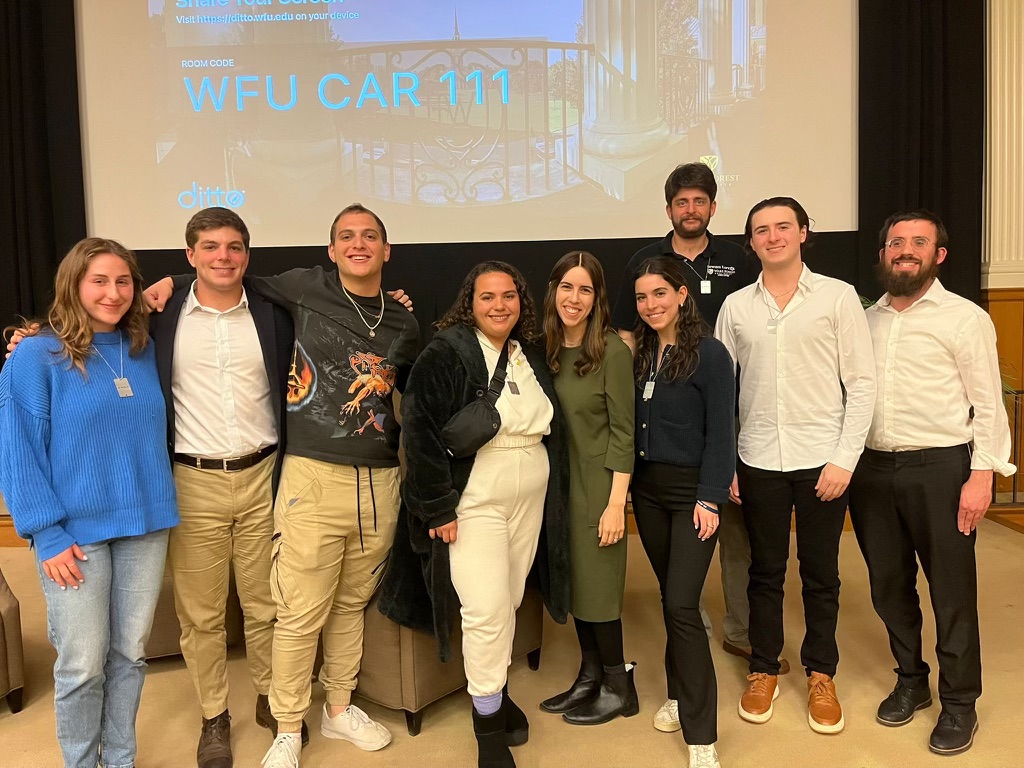Wake Forest prides itself on its Pro Humanitate motto and its commitment to leaving the world better than we found it.
The Office of Sustainability leads campus environmental initiatives, which naturally support this commitment. Departments across the university — from biology to dance — embrace the integration of sustainable education in the classroom. But, one division on campus, the School of Business, has largely opted out.
“The business school has some funding streams and has made very explicit strategic decisions to align itself with a particular political thought,” said Dedee Johnston, Wake Forest’s chief sustainability officer.
Currently, more than 1,700 businesses have pledged their commitment to meet the Paris Agreement goals, joining the movement “We Are Still In,” while the Trump administration remains on the sidelines. With companies increasingly embracing environmental, social, and governance (ESG) strategies, an expectation is developing that business students graduate with and understand the core tenets of sustainability in business practice. Stanford, Michigan, Berkeley, Duke, NYU and other programs across the country are racing to meet this critical demand, incorporating sustainability and social responsibility as distinguishing factors in their respective business curriculum.
While other business programs prioritize environmental practices as essential to business success, the business school has largely opted out of embracing sustainability in its curriculum, instead partnering with the BB&T Center For Capitalism to guide students in ethical business decision making. James Otteson, the Thomas W. Smith Presidential Chair in Business Ethics for the business school, is also the Executive Director of the BB&T Center.
Without exposure to the tenets of sustainable business strategy, there is concern that students, as future business leaders, may not be in a position to meet the full objectives of Pro Humanitate.
“The private sector is shifting from an entire focus on short-term earnings, to incorporating a necessary focus on short-term earnings with a long-term view,” Johnston said, stating that, for example, companies which rely on natural resources are beginning to realize that climate change is a long-term problem which requires action today.
“We don’t think long-term,” said Wake Forest Professor of Marketing Michelle Steward, explaining that arming students with business professional skills is the more immediate focus. “We’re thinking breaking news. [The environment] is your grandchildren’s problem.”
After consideration following interviews for this reporting, Steward applied for the Magnolia Curriculum Project, and hopes to incorporate sustainability into her marketing curriculum next fall, implementing long-term objectives in her classroom.
Sustainability is a core lens through which to look at organizations, and thus, it is a relevant, fundamental discipline across business curriculum. Rather than embrace sustainability as a natural feature to emulate the larger university model, the core curriculum instead emphasizes data analytics. Dan Fogel, an expert in global sustainable business strategy and a former Wake Forest School of Business professor and former Associate Dean of the MA Program, left the business school after spending years unsuccessfully advocating to implement sustainability in curriculum.
“The current administration is worse than the previous one,” Fogel said. “They’re autocratic; they don’t listen to faculty. It’s a tough place. It’s so politically charged. If they really believed in the model of the university, at least a portion of the curriculum should be emphasizing social responsibility and environmental sustainability.”
Johnston has two business degrees herself, and is frustrated with the ambiguity, and lack of traction she’s gained through her own attempts to encourage the adoption of sustainable practices in the business school.
“90 percent of the potential employers the university is working with have sustainability goals,” Johnston said, stating that there is no “market demand influence” behind the lack of sustainability in curriculum.
“We need to arm you with the skill sets to do your job: think critically and synthesize facts,” Steward said. “Sustainability efforts are a separate discipline.”
The challenges in implementing sustainability curriculum extend beyond the faculty and administration of the business school. The traditional model of business that the school embodies, the faculty this model attracts, and the subsequent like-minded community it creates, present further obstacles for change.
“I think it’s a responsibility of the business school to be able to present that information,” Fogel said. “I don’t think students really have a full appreciation [of the importance of sustainability]. Students have to be introduced to it.”
The Magnolia Curriculum Project at Wake Forest is a workshop which explores integrating sustainability into curriculum across disciplines, providing faculty with knowledge and the opportunity to understand the urgency and power of incorporating this education in the classroom. Over 50 Wake Forest professors have participated in this initiative; only one of whom is a professor at the business school.
“The Magnolia Curriculum Project is really biased towards the humanities,” Fogel said. “If a business school faculty member were to [join the project], they wouldn’t feel at home.”
Fogel attempted to address this concern, working with students to write case studies and create curriculum materials specific to disciplines in the business school, such as finance, accounting and marketing. However, his efforts gained little traction, and were ultimately shut down.
“[The Business School] is the perfect place for [integrating sustainability into curriculum],” Fogel said. “[The Magnolia Project] has this humanities focus that could be included within the business school so easily. They just missed the boat.”
Ann Bliss, a Wake Forest Professor of Legal Environment of Business, came to the university hoping to bring her experience in environmental and social justice advocacy into the classroom. Two years later, Bliss is frustrated by the disconnect between preparing students for the business environment and incorporating sustainable strategies.
“If we don’t try to practice some humility around others, we’ll practice arrogance,” Bliss said. “The country needs this right now. We shouldn’t present ourselves as having all the answers.”
“When resources are becoming scarce you have to put on a radical creativity hat and look at how your business has to adapt,” Johnston said. “If you’re not thinking about employee engagement and creating opportunities for employees to lead the way when it comes to innovation, you might as well close your door today, because you’re going to be out of business tomorrow.”
Blake Wynveen, a junior Business and Enterprise Management major and Environmental Studies minor, is frustrated the business school does not offer sustainable business practice education, requiring him to pursue his interests elsewhere.
Wynveen is the second Business and Enterprise Management Major to create his own concentration in Sustainability and Strategic Development, and one of the few Environmental Studies minors in the business school.
Wynveen fears he and his peers won’t be on the cutting edge of environmental and sustainability issues. Meanwhile, Wynveen encourages the student body to become more committed to environmentalism.
“We as a university are very set in traditions,” Wynveen said. “We’re resistant to change. We still roll our quad with toilet paper.”














Goose Ravenscroft • Apr 22, 2018 at 3:51 pm
Nothing short of hilarious that 95% of the articles in this publication still talks about the toilet paper
TD • Apr 22, 2018 at 11:27 am
British magazine
The Economist, mentioned on WFU’s website,
ranks business schools. A quick peek at their top-rated school
Northwestern
University – Kellogg School of
Management and its offerings in sustainability:
Offers MBA, concentration in Sustainability
Students pitch environmentally conscious business plans to alumni at the
inaugural Kellogg Sustainability Challenge
Focus on sustainability. Environmental concerns
come to the fore during Green Week at the Kellogg School
Classes include: ACCT-459-5
Sustainability Reporting and Analysis
KPPI 936 Sustainability Across the
Enterprise
and others